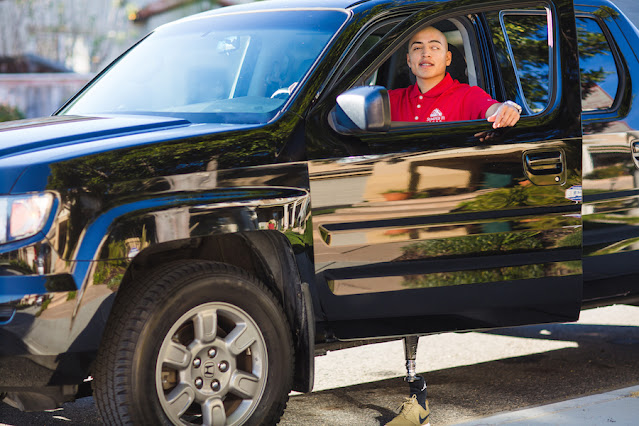Center for Rehabilitation Sciences Research Partners with UPitt, Catholic University for Accessibility, Mobility Study
By Sharon Holland
Different levels of automation pose distinct challenges for people with disabilities and further research is needed to better understand these needs, and to develop design strategies to meet them.
The Center for Rehabilitation Sciences Research (CRSR) at the Uniformed Services University of the Health Sciences is partnering with the University of Pittsburgh and the Catholic University of America to address these needs thanks to a $1 million grant from the U.S. Department of Transportation.
“The National Highway Traffic Safety Administration released federal guidelines in late 2019 governing automated vehicles, but failed to address the specific needs of individuals with disabilities. Similarly, the Society of Automotive Engineers published international standard J3016, which includes a common taxonomy and definitions for automated driving to simplify communication and facilitate collaboration within technical and policy domains. However, it also failed to define any key terms or unique issues related to the usability or accessibility of individuals with disabilities,” said Dr. Paul Pasquina, USU Principal Investigator for the study. “This would best be accomplished by incorporating the principles of participatory design, where all stakeholders (e.g. engineers, designers, clinicians, scientists, and people with disabilities) work collaboratively in a transdisciplinary fashion.”
In response, the ASPIRE -- Automated vehicle Service for People with disabilities – Involved Response Engineering (ASPIRE) Center -- has been established at Pitt to bring a group of experts together across academia and the transportation industry to meet with individuals with disabilities and clinicians to better problem solve the unique needs of this vulnerable and often underserved community. The project aims to conduct a systematic literature review to develop a clear understanding of the current trends and implications for future travel related to accessible automated vehicles and services. In addition, a pilot survey of stakeholders, including individuals with disabilities, their travel companions and/or caregivers, designers, medical providers, and mobility service experts (e.g. vehicle manufacturers and modifiers, as well as adaptive driving training instructors) will be conducted. Once the information is collected, the team will synthesize the data to understand the current and future needs of potential stakeholders of accessible automated transportation and services. This will involve presenting summary survey findings, extrapolating findings to the greater population of potential automated vehicle users, combining the data with publicly available datasets to understand factors that influence travel, displaying clusters of users based on their characteristics and needs, and developing solid model drawings that illustrate key features and parameters for implementing automated vehicles and mobility services.
The ASPIRE Center, through its projects and activities, will also provide a roadmap for manufacturers and transportation system providers that is responsive to the needs of people with disabilities and demonstrates a path forward for the integration of accessible automated vehicles and mobility services. Through engaging and energizing stakeholders, the ASPIRE Center will create a community of practice that accelerates accessible automated vehicles and mobility services in an inclusive manner, which will be beneficial to the plurality of stakeholders.
CRSR will provide clinical expertise in the field of rehabilitation medicine, particularly related to meeting the unique needs of combat casualties and their families.
“This is a unique opportunity to help shape the future of automated transportation to be accessible to all individuals, and ultimately expand improved access to transportation to our most vulnerable populations,” Pasquina said.
The DOT grant is for 18 months, and is part of a wider strategic plan to increase accessibility in mobility and transportation and support the development of new inclusive, affordable transportation technologies that address mobility and access challenges. In addition, DOT also devoted $1 million to developing a resource library for automation accessibility.







